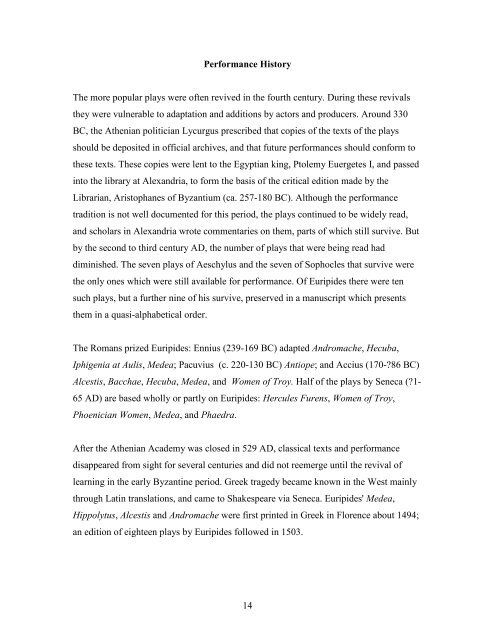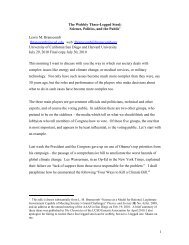1 EURIPIDES' TROJAN WOMEN PREFACE, TRANSLATION, and ...
1 EURIPIDES' TROJAN WOMEN PREFACE, TRANSLATION, and ...
1 EURIPIDES' TROJAN WOMEN PREFACE, TRANSLATION, and ...
You also want an ePaper? Increase the reach of your titles
YUMPU automatically turns print PDFs into web optimized ePapers that Google loves.
Performance History<br />
The more popular plays were often revived in the fourth century. During these revivals<br />
they were vulnerable to adaptation <strong>and</strong> additions by actors <strong>and</strong> producers. Around 330<br />
BC, the Athenian politician Lycurgus prescribed that copies of the texts of the plays<br />
should be deposited in official archives, <strong>and</strong> that future performances should conform to<br />
these texts. These copies were lent to the Egyptian king, Ptolemy Euergetes I, <strong>and</strong> passed<br />
into the library at Alex<strong>and</strong>ria, to form the basis of the critical edition made by the<br />
Librarian, Aristophanes of Byzantium (ca. 257-180 BC). Although the performance<br />
tradition is not well documented for this period, the plays continued to be widely read,<br />
<strong>and</strong> scholars in Alex<strong>and</strong>ria wrote commentaries on them, parts of which still survive. But<br />
by the second to third century AD, the number of plays that were being read had<br />
diminished. The seven plays of Aeschylus <strong>and</strong> the seven of Sophocles that survive were<br />
the only ones which were still available for performance. Of Euripides there were ten<br />
such plays, but a further nine of his survive, preserved in a manuscript which presents<br />
them in a quasi-alphabetical order.<br />
The Romans prized Euripides: Ennius (239-169 BC) adapted Andromache, Hecuba,<br />
Iphigenia at Aulis, Medea; Pacuvius (c. 220-130 BC) Antiope; <strong>and</strong> Accius (170-?86 BC)<br />
Alcestis, Bacchae, Hecuba, Medea, <strong>and</strong> Women of Troy. Half of the plays by Seneca (?1-<br />
65 AD) are based wholly or partly on Euripides: Hercules Furens, Women of Troy,<br />
Phoenician Women, Medea, <strong>and</strong> Phaedra.<br />
After the Athenian Academy was closed in 529 AD, classical texts <strong>and</strong> performance<br />
disappeared from sight for several centuries <strong>and</strong> did not reemerge until the revival of<br />
learning in the early Byzantine period. Greek tragedy became known in the West mainly<br />
through Latin translations, <strong>and</strong> came to Shakespeare via Seneca. Euripides' Medea,<br />
Hippolytus, Alcestis <strong>and</strong> Andromache were first printed in Greek in Florence about 1494;<br />
an edition of eighteen plays by Euripides followed in 1503.<br />
14









